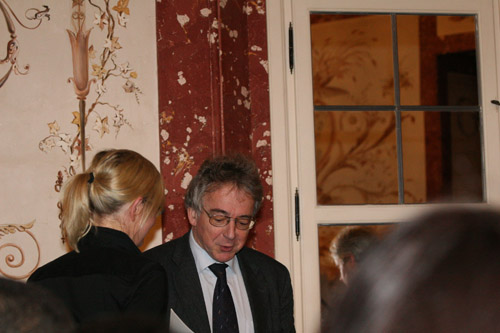
اعلی معیار کی ابتدائی بچپن کی تعلیم کے پروگرام کے ذریعے غربت کے خلاف جنگ لڑ کرنے کے لئے متعدد شراکت کی طرف سے تبادلہ خیال کیا اور حمایت کی ایک مسئلہ ہے تعلیم کے لئے گلوبل تلاش سیریز. Researchers, educators and policy makers have argued that vital learning can and should begin before age 5. When schooling starts for poor children at kindergarten or first grade they have already missed out on vital opportunities to develop skills needed to help them thrive academically, socially, physically and emotionally in their early years of learning.
آج میں تعلیم کے لئے گلوبل تلاش, it is our honor to share the views of Professor Dr. Wolfgang Schneider on pre-school learning and additional matters related to the German and other education systems.
ڈاکٹر. وولف گانگ شنائیڈر فی الحال نفسیات کے سیکشن میں نفسیات کے پروفیسر ہیں, جرمنی کی یونیورسٹی, جرمنی. His research interests include the development of memory and metacognition, ذہین اور مہارت, پڑھنے اور ہجے کی ترقی, as well as the prevention of reading and math difficulties. He was Vice President and President of the German Psychological Society (2000-2004), جرمنی کی یونیورسٹی کے اور بھی نائب صدر (2004-2009). وہ کے بارے میں کے مصنف اور شریک مدیر ہیں 40 کتابیں, سمیت Memory Development between Two and Twenty, which he co-authored with Michael Pressley. He is currently President of the International Society for the Study of Behavioral Development (ISSBD).

There are a number of prominent views in the US that pre-school education makes a significant difference in the success of children in primary school. What are the essential elements of this education and what is the impact on child development? Do you believe it can have a significant impact on the achievement gap between affluent and poor children?
Early language skills have to be developed. This is something that the German government is trying to intensify at the moment. We have made some progress regarding the phonological training programs in our country. We also have evidence that training children in phonological awareness helps them to develop the first stages of reading and spelling in school. We have evidence regarding early math training programs too and there are a few rather effective approaches there.
So there has been evidence that early pre-school programs make a difference, particularly for kids at risk. We did a couple of studies with children at risk and compared their improvement with normally developed children. We found that children at risk really can catch up if they have training in the early years. And when they are able to move up to the same level as normal kindergarten kids, they seem to be able to develop well in school.
آپ کو ڈیزائن اور اس کے بچوں کی ذہنی ترقی پر کیا اثر پڑا ہے کہ کنڈرگارٹن کے تربیتی پروگراموں کی نوعیت کیا ہے? پروگراموں امیر اور غریب کے ساتھ یکساں طور پر مؤثر ہیں?
We designed a popular training program with two components. One focuses on phonological awareness in both the broad and narrow sense. Phonological awareness in the broad sense would be something like rhyme identification or syllable segmentation. Phonological awareness in the narrow sense means identification of phonemes in syllables. We found it was possible to get German speaking kindergarten children to identify phonemes in syllables and words, and those kids who satisfied that criteria were able to acquire reading and spelling skills earlier than usual. We combined the phonological awareness training with letter-sound coordination training. And so for some frequently used letters, وہ phonemes سے ربط کس طرح ہم بچوں کو سکھایا. This helped the children pick up the letter phonemes training in school. We had control groups in our studies that did not receive phonological training but participated in the usual kindergarten program. Thus we were able to compare kids who were trained and kids who did not participate. We discovered that the trained kids had an advantage by the end of kindergarten and kept that advantage during their first years in school. It’s very important that there was a long lasting effect here. Particularly with kids who had poor initial skills.
Right now we are developing an early educational program for kindergarten children for all 16 states in Germany. We will finish our proposal at the end of 2012.
آپ پیسا ٹیسٹ کے طالب علموں کے ذہنی رجحان کی مکمل رینج کا ایک مؤثر طریقہ ہے کہ لگتا ہے?
I don’t think it’s an effective measure of the full range of mental aptitudes. It does give you a good impression of 15-year-old students’ پڑھنے کی مہارت, ریاضی کی مہارت اور سائنس کے علاقے میں نمٹنے کے لئے ان کی صلاحیت, but we don’t get any evidence about their intellectual abilities. میں 2000 we included a measure of non-verbal intelligence in a German extension of the PISA study which compared performance among the 16 German states and which was based on a large sample of about 50,000 طالب علموں کو. When we assessed the impact of intelligence on performance in math, reading and science, we figured out that non-verbal intelligence was a strong predictor in most of these tests.
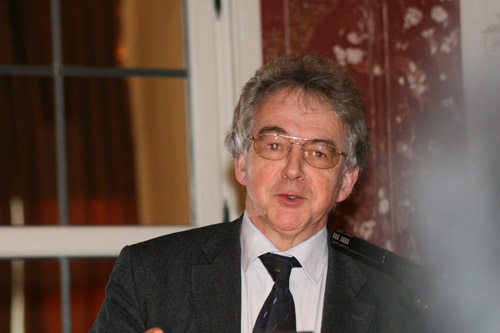
Do you think that in some countries, teaching to the PISA test is now occurring?
I think that this probably does happen and I think that is a problem. تاہم, I also believe that the way the PISA organization process works makes it difficult. In Germany for example, schools are selected at random. And there is almost no chance for a school to escape once it has been selected. I suppose there could be a couple of schools in the sample that have practiced for the test but we don’t think that would apply to the entire sample.
Do you think that some countries have educational curricula that provide better preparation for the test than others? Does it surprise you that “grinder” جنوبی کوریا اور اس طرح فن لینڈ طور پر کم منظم ممالک کی طرح دونوں ممالک کے ٹیسٹ پر بہت اچھی طرح سے کر?
پیسا ٹیسٹ کے نتائج پر مختلف تعلیمی نظام کے اثرات کے طور پر, یہ واضح نتائج کے ساتھ آنے کے لئے یہ بہت مشکل لگتا ہے. تم ممالک کے ایک متنوع گروپ مختلف تعلیمی نظام کے ساتھ پیسا نمونے میں شامل کیا ہے, so you have to be very careful when you compare. تاہم, ہم سے دیکھا ہے کہ مختلف پیسا نمونوں کے لئے منایا کامیابی کے پیٹرن 2000 کرنے کے لئے 2009 seem to be rather consistent for most of the countries participating. The countries at the top for reading and math, such as Finland and the Asian countries, are famous for their superior curricula in these domains and their competent training programs. So their excellent performance does not seem to be surprising.
The Finnish educational system really focuses on all children, including the weak children, کلاس رومز میں. نتیجہ کے طور پر, فننش بچوں میں کامیابی بادبانی سب سے زیادہ دوسرے ممالک میں بچوں میں بادبانی سے بہت چھوٹا ہے. اتنی فن لینڈ ایک اعلی سطح تک تمام ان کے بچوں کو لانے کے ساتھ کامیاب ہے, جس میں بہت سے دیگر ممالک کو حاصل نہیں.
اگر آپ جنوبی کوریا جیسے ملک میں تدریسی طریقہ ہائے کار پر نظر ڈالیں تو, you see that there is a lot of drilling and practice and very heavy workloads on the students. This is something we do not have in Germany. So I think the quantity of instruction in South Korea makes a big difference here. In former times, Benjamin Bloom in the US already noticed that the quantity of instruction and the time given to reach a criterion is usually a good indicator of student outcomes.
What are the key strengths and weaknesses of the German educational system as you see it?
جرمنی میں ہم میں مختلف نصاب ہے 16 different states. A couple of states, بویریا اور Saxony سمیت, seem to do very well and may even compare with the Finnish achievement scores. The teachers follow the curriculum pretty strictly, which seems to make an impact. We have systematic findings that show while some of our states perform very well others perform poorly. Each state has its own policy. پالیسیوں میں بہت کچھ اختلاف, and the states are not able to agree on a common curriculum. Our federal ministry of education has tried to change that but it is difficult as our law states that education must be linked to the state policy.
What is the mix of arts in the usual curriculum in Germany? How do you the see role of the arts in primary and secondary education?
I believe the arts are underestimated in our system. Whenever teachers have to cut hours in a curriculum, the arts get cut first. We have to change that. I believe the arts are important. I think we should start an arts education at the beginning of elementary school, which is not the case now. The major argument against the arts is always that kids shouldn’t do too much in the early years of their education where the emphasis must be on reading, writing and math. Thirty years ago this was not the case as music education started earlier. Now that has changed and it is not a good development.
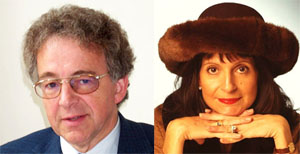
Photos courtesy of Professor Dr. وولف گانگ شنائیڈر.
تعلیم کے لئے عالمی تلاش میں, سر مائیکل باربر سمیت میرے ساتھ اور عالمی سطح پر معروف فکری رہنماؤں (برطانیہ), ڈاکٹر. مائیکل بلاک (امریکہ), ڈاکٹر. لیون Botstein (امریکہ), پروفیسر مٹی Christensen کے (امریکہ), ڈاکٹر. لنڈا ڈارلنگ-ہیمنڈ (امریکہ), ڈاکٹر. مادھو چوہان (بھارت), پروفیسر مائیکل Fullan (کینیڈا), پروفیسر ہاورڈ گارڈنر (امریکہ), پروفیسر کریں Yvonne ہلمین (نیدرلینڈ), پروفیسر کرسٹن Helstad (ناروے), جین Hendrickson نے (امریکہ), پروفیسر گلاب Hipkins (نیوزی لینڈ), پروفیسر Cornelia Hoogland (کینیڈا), مسز. چینٹل کوفمین (بیلجیم), ڈاکٹر. Eija Kauppinen (فن لینڈ), سٹیٹ سیکرٹری Tapio Kosunen (فن لینڈ), پروفیسر ڈومینک Lafontaine (بیلجیم), پروفیسر ہیو Lauder (برطانیہ), پروفیسر بین لیون (کینیڈا), پروفیسر بیری McGaw (آسٹریلیا), شیو ندار (بھارت), پروفیسر R. نٹراجن (بھارت), ڈاکٹر. PAK NG (سنگاپور), ڈاکٹر. ڈینس پوپ (امریکہ), شریدر رازگوپالن (بھارت), ڈاکٹر. ڈیانے Ravitch (امریکہ), سر کین رابنسن (برطانیہ), پروفیسر Pasi Sahlberg (فن لینڈ), Andreas کی Schleicher (پیسا, او ای سی ڈی), ڈاکٹر. انتھونی Seldon نے (برطانیہ), ڈاکٹر. ڈیوڈ Shaffer کے (امریکہ), ڈاکٹر. کرسٹن عمیق کر رہے ہیں (ناروے), چانسلر اسٹیفن Spahn (امریکہ), ایوز Theze (اسکول Français کی امریکی), پروفیسر چارلس Ungerleider (کینیڈا), پروفیسر ٹونی ویگنر (امریکہ), سر ڈیوڈ واٹسن (برطانیہ), پروفیسر Dylan کے Wiliam (برطانیہ), ڈاکٹر. مارک Wormald (برطانیہ), پروفیسر تیو Wubbels (نیدرلینڈ), پروفیسر مائیکل نوجوان (برطانیہ), اور پروفیسر Minxuan جانگ (چین) وہ تمام اقوام کو آج سامنا ہے کہ بڑی تصویر تعلیم سوالات دریافت کے طور پر. تعلیم کمیونٹی پیج کے لئے گلوبل تلاش
C. M. روبن وہ ایک موصول ہوئی ہے جس کے لئے دو بڑے پیمانے پر پڑھا سیریز کے مصنف ہے 2011 میں Upton سنکلیئر ایوارڈ, “تعلیم کے لئے گلوبل تلاش” اور “کس طرح پڑھیں گے?” انہوں نے تین bestselling کتابوں کے مصنف ہیں, سمیت Wonderland میں یلس اصلی.


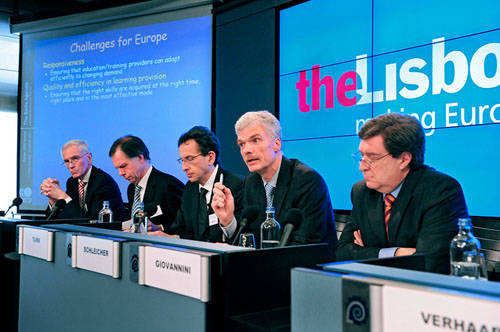
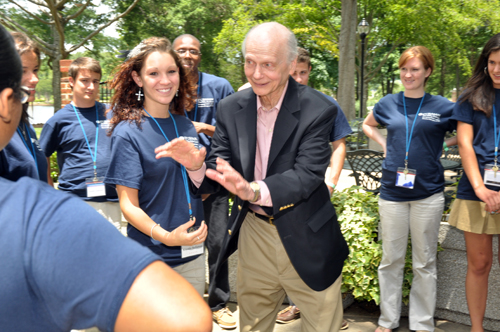


حالیہ تبصرے